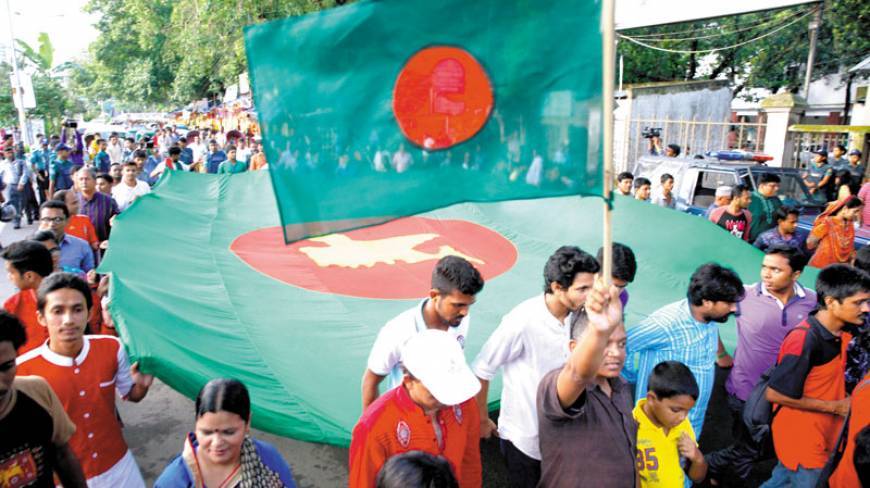There is a belief that madrasa students are vulnerable to recruitment by violent extremist groups. Is this the case?
First of all, it is incorrect to say that madrasa students are being radicalised. The majority of madrasa students in Bangladesh, India and Pakistan are peaceful and come from poor backgrounds and serve their communities as basic religious functionaries.
Occasionally, on issues like defamation and blasphemy, madrasa students are mobilised to protest offences against the Prophet Muhammad. But the majority of madrasas are neither involved in violence nor radicalisation. They have a different set of challenges. Madrasa communities do not share the same level of literacy or world view as secular people. And that is the fault line.
There are New York Times reports that Saiful Islam, who was a Bangladesh madrasa student, was arrested in connection with the deaths of bloggers. Yet, we are not told which madrasa. Did he belong to a Qawmi madrasa? Was he a Deobandi, a Barelwi or Salafi?
These reports lack information that make them difficult to believe. Madrasas appear to serve as a scapegoat for serious political divisions and political failures in law and order and security in Bangladesh.
If six well educated Bangladeshis engage in an IS-influenced terror attack, do we say all Bangladeshi university students are engaged in terrorism? Obviously not. So why the double-standard when it comes to madrasas? When madrasa leaders and students are involved in violence, the media must take their names, identify their madrasa and identify which orientation of the multiple streams of madrasas these people belong to.
So what’s going on?
Rich, elite Muslims are the biggest challenge today. Especially the rich and elite who become religious but have a very minimal literacy of Islam.
They do not understand Islam’s teachings. They have little understanding of Islamic law, Quran interpretation and lack complex literacy. These individuals suffer from what I call a poverty of dignity.
Radical interpretations of Islam offer a language to express political grievances.
They have high levels of education and wealth but do not experience dignity in the globalised world. So they join a global tribe called Islam and they live in that Islam [sic] bubble. They begin to see their self worth not within the context of Bangladesh but within the context of the Umma, as a place of salvation.
Groups like IS target them and tell them not all people in the Umma are good and that IS members are the best. They say they follow the Sharia in its original form and these elite kids with poor Islamic literacy become persuaded. Many of them might previously have lived sinful lives of sex, women and drink.
So the fake-Islam addiction they get from IS gives them a quick path to redemption – a fallacy in terms of proper Islamic teachings. But they fall for the fake-Islam addiction. Since these elite kids can read English and are aware of global issues they witness the destruction in Iraq and Syria, they see images of Guantanamo Bay prison and their sympathies are cultivated to fight for the “Islamic” cause, because there is also a global lake of Muslim victimhood from Iraq to Burma. Anyone can draw the water of grievance from that lake of victimhood and feel justified in become a jihadi Muslim on steroids. So these selfie-taking, Facebook and AK47-toting jihadis try to make themselves into Bollywood heroes.
What about family guidance?
The families of these elite kids are also not well educated about Islam. Most of their parents lived secular lives and were hardly religious for most of their lives. At some point the parents become devout, but devout not based on sane Islamic literacy. When they see their kids grow beards, pray five times a day and fast in Ramadan, they become happy and boast: “Oh my son is a practising Muslim, my daughter wears the hijab so she is a practicing Muslim and will get a good Muslim husband.” Meanwhile they don’t have sophisticated literacy. They don’t know what their kids are doing on their computers and in which chat-rooms they are talking to jihadis who are trying to recruit them.
Parents are just too happy to a see a beard and hijab on their children and think they are Islamic. The moral of the story is this: all Muslim parents must adopt a sophisticated Islamic education and procure the same for their children. This do-it-yourself Islam that people get from self-help manuals are most toxic and dangerous. You need qualified scholars to educate your children. Reading the Qur’an unsupervised or reading the hadith unsupervised can create the most toxic misunderstanding and result in dangerous practices.
The most toxic element in these elite Muslim families is this: many elite Muslims believe in conspiracy theories. So if you investigate the family backgrounds of all elite jihadis you will find that at home many of them believe in fantasy stories about the world. They believe 9/11 never happened and that it was caused by the US government as a pretext to invade Iraq. They believe weirdly that all the problems in the world are caused by Jews or by Hindus.
Source: Dhaka Tribune










